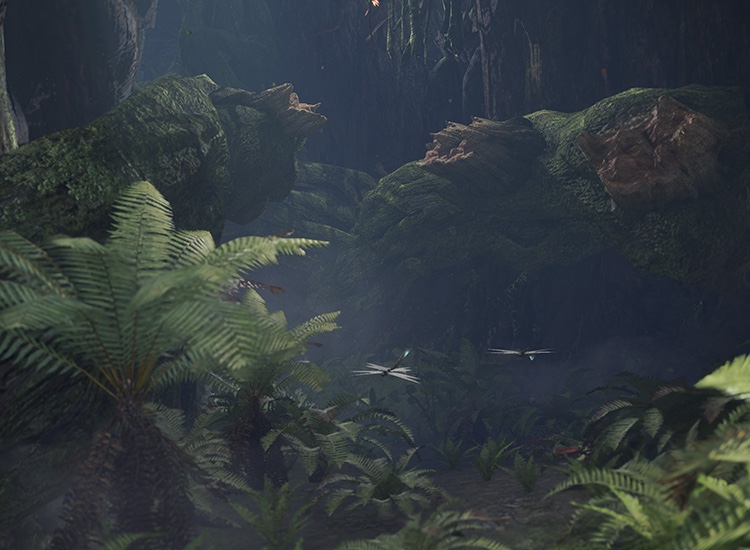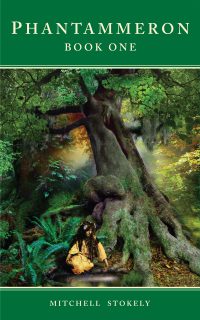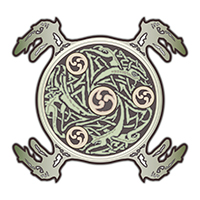Many of my readers may wonder about Phantammeron Book One (2015), and the meaning of the story portrayed in the book. Even though the first book was a Creation Story, a large part of the meaning behind the novel and the overall series lies in the twilight forest called Phantaia.
A major motivation for writing the initial Phantammeron story was the desire to portray a history of a “fairy heaven” or “Other World”, as the old Irish fantasists might say. Early on when I started exploring Western Mythology, I came across a lot of literature about the mysterious twilit world of faerie in old English and Irish myth. Part of the mystery of so many ancient texts describing these places was a question: Why so much of western European literature focused on these fantasy places and people? A big part of the answer involved the inspiration of Nature in Indo-European Mythological cosmologies and the use of its primeval forms to present the mysteries of the universe in Western thought.

The theme of Faerie is often of a connection to a mysterious pre-Christian people that were said to have existed just beyond the sea, or beneath the waves, or underground, or beyond the distant clouds, etc. The concept of a culture of mysterious other-worldly people dwelling in unexplored lands or wild, natural places just beyond reach in a pre-history that never existed conjured up in myth and story a deep connection to the natural world and its deification in Western pre-Christian religion. For it was the ancient worship of the sun and the earth as anthropomorphic forms and their power over the natural world that forged the basis for fantasy races, I learned.
It was almost as if this fairy world of our ancestors involved the mystery of what lay just beyond their vision and comprehension; a place where only the imagination might go. I could see the old sailors in Irish story desiring to sail beyond the farthest reaches of the Western Atlantic to find the Other World but that those that tried, not returning, generated fear in countless generations of what lay beyond the most Western seas. And so some level of mystery as well as terror was involved, and so the idea that those who sought Faerie might never return became real.
I also came to see these ancient pagan stories of the Other World as representative of an ideal or perfect civilization….of great cities and lands more glorious than our own. Initially I saw in the descriptions of these places descriptions of cities of silver and gold, towers of ivory, cloud castles, or vast elvish lands akin to what Tolkien described. But over time in seeing Faerie I saw beyond these fantasy civilizations and into a “perfect paradise” or wilderness describing Faeryland where Nature in its purist form might stand alone as the true origin or heaven of the peoples of the Other World.
And so in my imagination I came up with the theme of a timeless paradise or fairy forest called Phantaia that predated all other origins for the fay. Maybe in ages past, long before mankind was born, they came to build silver castles in the clouds that lay beyond mankinds greatest dreamers, or they sailed the seas beneath the waves when the world was young. But their eldest homes must have been from something far more ancient and fantastic…..Primitive Nature itself in its purest form; some ancient Earth within our own, a secretive and silent source for all the trees, all the woods, all the seas ever known in this world. I sensed Tolkien saw such visions for his own elvish origins. But in my own I saw beyond concretion of place and into a mist that could not be penetrated .
But I sensed in this imaginative and mysterious idea for a fairy origin or heaven something much more ancient and more profound. I saw a story, a history. But I saw a mystery not to be fully penetrated; something hidden. If I could grasp this mysterious place and condense it into story and a vast history I might finally grasp it and hold it visually in this plane. Such was the exploration of my early stories.
Such a deep sense of ancient Nature unspoiled and yet fantastic and beyond anything known in this world was the basis for Phantaia, the Forest of Twilight. And so it came to be as the truer origins of the Nature children called Faery or Fay in my novels and this the Phantammeron.
That is in essence what the books are about, or at least one of its main themes. For Phantammeron means Book of the Forest and as such is a Bible for the Faerie, as I see conceived it; a history of the tragic beginning and end of their Heaven. For heaven to any children of nature, as the Faery are, is Nature itself in its grandest and purist form. And all that should come later, no matter how grand and glorious their civilization or wars or cities or struggles should begin in a place more fantastic than anything yet conceived in literature.
And that is the basis for Phantaia’s descriptions in the book. If you follow the first Phantammeron book you should see that I have tried to describe this faerie heaven as but a wilderness so vast and ancient that nothing could equal it in this world. Its great trees bathed in violet mists; its emerald leaves silver tipped and cast aglow in a dim eternal twilight, dripping with dew was a desperate attempt to reveal its mystery, to make visual its hidden beauty, and to describe its endless majesty to the reader. I may or may not have succeeded. If anything the vagueness I had hoped could allow the reader to fill in the rest. For in truth great imaginative literature doesn’t fully describe, but leaves room for the reader to generate its real truth in their own minds.
In later books you will see how the Godlike beings in the first books for the origin tale for the faerie peoples that appear in later worlds derived from Phantaia. In that sense I’ve tried to frame the first Phantammeron books as the basis for a much vaster mythology of dramatic events and characters. It is thus my Silmarillion, and a source for all that shall come later, should I complete my great opus or book series.
Phantaia should be seen as not just a fantasy place, but our Nature’s heaven; a paradise beyond any other Man could ever make on Earth. For the woods and the wilder places left in this world to me hold a primeval truth we may be too late to see and thus preserve. It was then my hope that my books reproduce what mankind will have lost in this world…..a perfect wilderness, wilder than any other, and whose beauty would be preserved in a book so that they might not forget what wilderness once was for ancient Man.
For the woods and the wild is the home of Gods and of Beasts and of the Fantastic and of Mankind’s greatest Horrors. Losing wild places we lose a piece of our own origins. For that is the true inspiration of Phantaia…..for the Faerie are but ourselves, and the woods our ancient home now destroyed by greed and short-sited men. The ancient woods were truly the heaven we too have lost like the fay in my books.
And so the tragedy of Phantaia and the story behind it I have hoped will affect you spiritually and emotionally as the writing of it affected me.
– the Author



